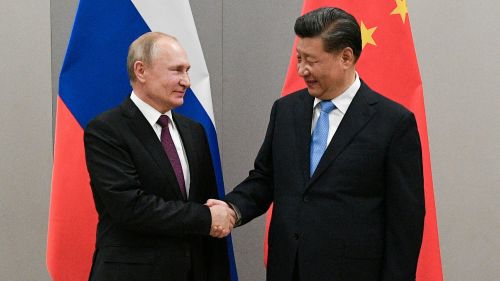Amid Global Unpopularity, China Might Find Support Among Russians

While China might be losing friends in many countries, it still has the support of the Russian public.
An Unpopular Moment for China
China’s international reputation is currently at a low point. According to a survey by the Pew Research Center, conducted from June 10-August 3, 2020 in 14 advanced economies around the world, a majority in all 14 countries has an unfavorable opinion of China, a significant increase from 2019.
Publics around the world are also skeptical of China’s leader, Xi Jinping. At least seven in ten in all the countries surveyed say they have not too much or no confidence in President Xi Jinping to “do the right thing” regarding world affairs. Americans, too, are growing more negative on China: a survey by the Chicago Council on Global Affairs from July 2-19, 2020 shows that American views on China, measured on a 0-100 scale, have hit an all-time low of 32, lower than any point in the Council’s polling record since 1978. A majority of Americans (55%) also regard now the development of China as a world power as a critical threat to the United States.
A range of factors may have contributed to this trend, from China’s trade protectionism to its territorial disputes with neighboring states, from the government’s crackdown on civil liberties and human rights to its obstruction of the World Health Organization’s investigation into the origin of COVID-19. But while China might be losing friends in many countries, it still has the support of the Russian public, as shown by a recent joint Chicago Council on Global Affairs-Levada Analytical Center survey.
A Sino-Russian Reconciliation
Though sometimes forgotten today, Russia and China did not always enjoy warm relations, despite the two countries’ geographical proximity and shared history of communism. In fact, Sino-Russian relations remained poor from the Sino-Soviet split in the early 1960s until the fall of the Soviet Union in 1991. Since then, relations between the two countries have gradually improved. In 2014, following sanctions from the United States and EU in response to the annexation of Crimea, Moscow upgraded its economic ties with Beijing. The two countries now have extensive cooperation in trade, energy, and security, and often coordinate their diplomatic moves to confront pressure from the United States.
Those formal ties between Beijing and Moscow are reflected in everyday Russians’ views of China. According to a Chicago Council-Levada Center joint survey conducted January 29-February 2, 2021, 74 percent of Russians have a favorable view toward China. That’s far more than hold favorable views of the European Union (45%) or the United States (39%). Xi is also relatively popular, with a slight majority of Russians (54%) expressing a positive view of China’s leader.
While polls find that China’s international reputation is generally worsening, a solid majority of Russians believe China is respected more today than 10 years ago (56%). About three in ten think that China is respected about the same as it was 10 years ago and only 8 percent think China is respected less. In contrast, a plurality of Russians (46%) say the United States has lost respect over the last 10 years.
Russians also generally have positive views of the growing Russia-China relationship. Levada Center surveys since 2014 have found that roughly four in ten Russians (40% in 2020) say China is Russia’s close friend, a higher percentage than for any other country. And though rising labor costs, political tensions, and supply chain disruptions caused by the pandemic have prompted many foreign businesses to consider pivoting away from China, the Russian public seems unconcerned about strengthening cooperation with China. A majority of Russians (56%) say Moscow’s active cooperation with Beijing is not increasing Russia’s dependence on China, compared to three in ten (28%) who say increased cooperation means Russia is becoming more dependent on China. Moreover, a majority of Russians think their country’s ties to China strengthen Russia’s international status (55%) while only nine percent say those ties weaken it.
Conclusion
As shown by the survey data, China’s recent transformations under Xi have not alienated the Russian public. But just as Russia found a partner in China when it faced sanctions over the annexation of Crimea, perhaps it should not come as a surprise that China finds support in Russia when it is facing backlash from the West. Unlike Russia, however, China is a primary beneficiary of the international trade system, and thus has stronger incentives to engage with major economies around the world. The true test for Russia-China partnership, therefore, might come on a different occasion—when China eases tensions with the West, particularly the US.